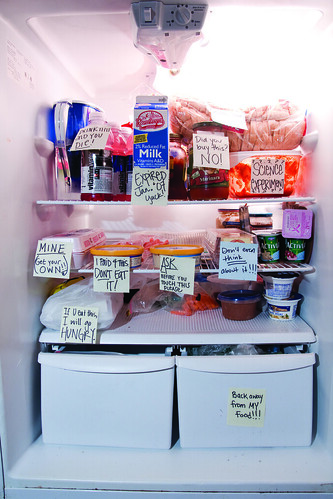Don’t let your co-workers get you down – make the most of your lunch break.

As most motivational speakers would say, “When one door closes, another one opens.” When dealing with office food-storage etiquette, if the refrigerator door closes, the next door to open will most likely be the garbage can lid.
Let’s get real: When you work in an office, a cloud of anxiety hovers above the communal refrigerator. A poster is probably hot-glued to the front door to display the absolute laws of the office kitchen. Or worse, there’s no posted authority, and the fridge is set to endure maximum chaos.
If rules regarding the office refrigerator are posted, the sign was likely purchased at Office Depot or typed up by some sort of Martha Stewart-type employee using Microsoft Publisher. Whatever these signs may actually say, their meanings all come down to one thing: We’re watching you.
So what is a student-worker, intern or newly hired employee to do? Our shifts may be shorter, our packed lunches may be more eccentric, but we deserve space in the refrigerator just as much as the office veteran.
Everyone has their mishaps. I’ve left something in the fridge at work just because I was too lazy to throw it away myself. I knew someone else would eventually toss it. But this is no way to live. If we don’t have a realistic structure for the communal fridge, we just inch closer to a disorganized society.
Appoint a Fridge Master
Someone needs to take charge. Opening a refrigerator and instantly being hit with the mysterious fridge smell is something no one should have to deal with.
D’Juan Lyons, a sophomore Spanish and political science major, works as a student-tutor in the labs at 1700 N. Broad St. In Lyons’ office, as many as 16 people could store their lunches in one fridge on any given day. Here’s the kicker: There are no rules.
“There is no supervision – it is a free for all,” Lyons said. “It really is every man for themselves.”
Without rules, it’s hard to say whose belly your celery sticks and peanut butter or meat-free microwavable meal will end up in.
See how scary lunch-refrigeration anarchy can be?
Time is not on your Side
At home, it is fun to hide a big jar of pickled eggs in the back of the fridge for when times become desperate. However, this behavior is not treated lightly in the office.
Cassie Carbaugh, a junior international business major, works for Temple Telefund in the Student Center. If a food item is left in the shared refrigerator for more than two or three days, a supervisor throws it away.
Not all offices are as cutthroat as Telefund’s, so familiarize yourself with your refrigerator deadline.
Michael Barnes, a senior women’s studies and psychology major, explained that where he works in the College of Liberal Arts’ academic advising center, two people are signed up each month to clean out the office refrigerator.
“Sometimes, [the refrigerator] does get a bit crowded with food that people leave, but the monthly cleaning is a way to ensure that it doesn’t build up and get continuously worse,” Barnes said.
This is proof that food storage without authority is just asking for trouble – for you and the designated stinky-foodstuffs disposer.
Stand Out
There isn’t much creativity when it comes to Tupperware, so here’s your chance to show your personality at work by getting artsy with your food storage. Dress up your plastic container with some Sharpie-marker designs – this will ensure that your co-workers never accidentally take your lunch and mistake it for their own.
It can be difficult to remember whether you brought the blue-topped Tupperware or the red-topped one. But the embarrassment of picking the wrong food tub can be so horrific that some employees will just eat what they grabbed and pretend the confusion never happened.
In the lab, Lyons said he never suffered the pain of a stolen lunch. But when a container of food is wrongly taken from the office fridge, unintentionally or not, the matter is subject to be the topic of possibly cruel office small talk.
Lie (If you must)
Like I said, we all have our mishaps. But sometimes, it is better to lie about it.
Do you really want to be known as the employee who continuously brings tuna into work and leaves it in the fridge to sabotage the rest of the refrigerator’s contents? If someone asks if you’ve been bringing the tuna sandwiches, you need to lie and say you are actually allergic to tuna fish. Having a bad reputation is worse than being hungry.
We all have to eat, but we don’t all have to eat in refrigerator-etiquette shame.
Samantha Krotzer can be reached at samantha.krotzer@temple.edu.



You are welcome to our website dedicated to filters of all kinds. We also have a wide range of refrigerator water filters. We deliver your order super fast.